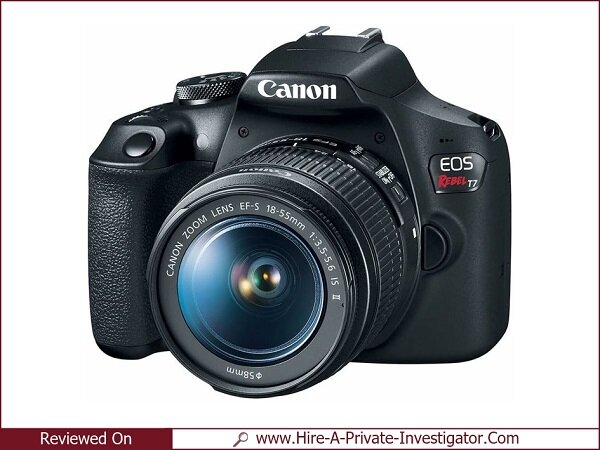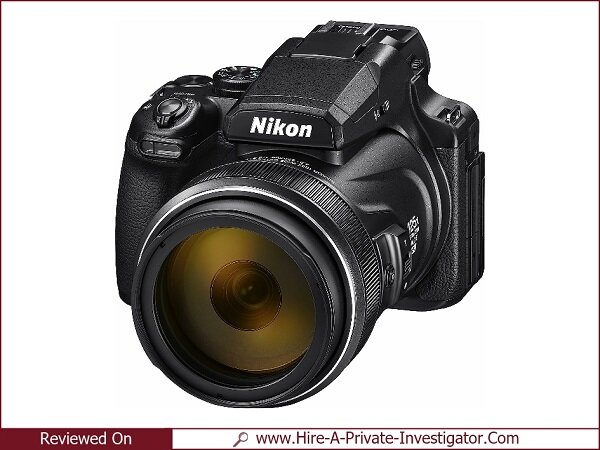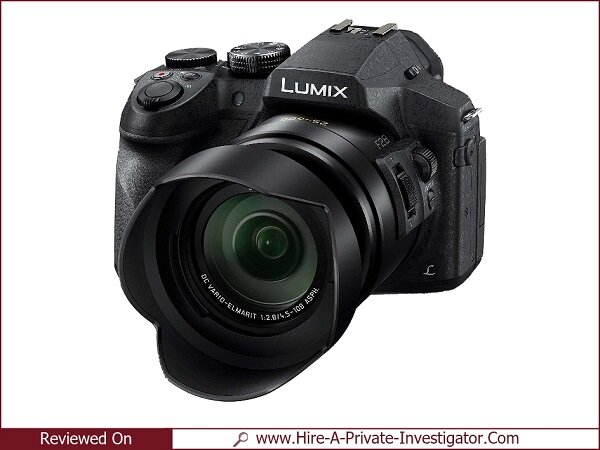When you purchase through links on our site, we may earn an affiliate commission. Here's how it works.
Home < Private Investigator Equipment < Best Cameras for Private Investigators
Best Cameras for Private Investigators
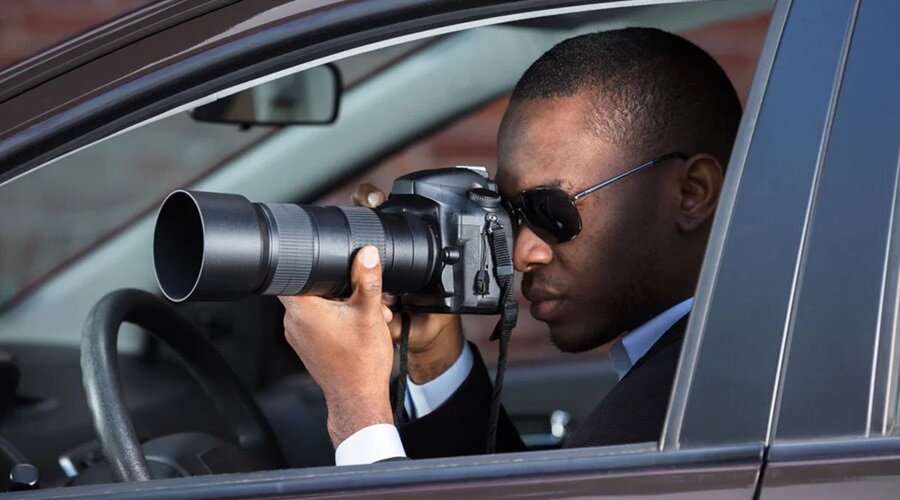
We know that in the private investigation industry, a camera is not just piece of photography gear, but an essential tool for investigative work. A private investigator camera can truly make or break a case - it should be reliably precise and able to withstand the environmental conditions it will be used in. Blurry, unfocused, pixelated images are not an option.
But with plenty of cameras available to buy, it can be tricky to choose the right one. This is why we have done the research and have selected what we think are some of the best cameras for private investigators on the market. In addition, we have created a buying guide with some key factors that will help you make an informed decision before buying a camera for surveillance work. Check out our top picks below.
What's In Our PI Camera Guide
- Quick List: Our Top 3 Best Private Investigator Cameras
- Quick Guide: How To Choose The Best Camera for Surveillance
- In-Depth Reviews: Complete Review Of The Best Cameras Suited for Private Investigations
- Complete Buyer's Guide: How to Choose The Best Private Investigator Camera
- Our Final Advice to Private Investigators Buying a Camera
Quick List: Our Top 3 Best Private Investigator Cameras
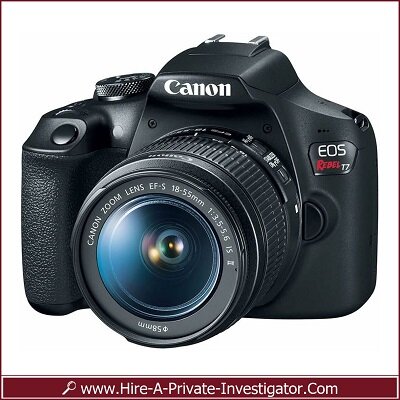
Zoom: 18-55mm & 75-300mm lenses. Image Sensor: CMOS 24.1 Megapixel. ISO Range: 100-6400. Video: FHD 1080p. Shooting Speed: 3 FPS. Battery Life: 500 photos.
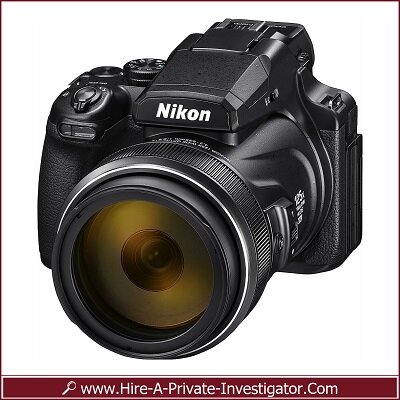
Zoom: 3000mm lens (x125 optical). Image Sensor: CMOS 16 MP 1/2.3”. ISO Range: 100-6400. Video: 4k UHD video. Shooting Speed: 7 FPS. Battery Life: 250 photos.
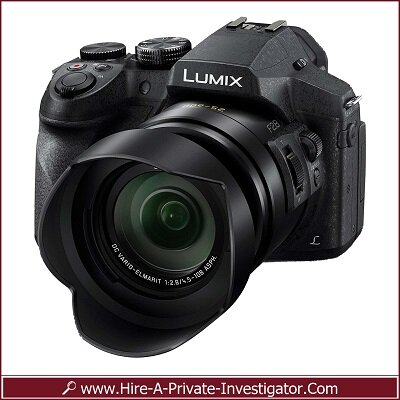
Zoom: 25-600mm lens (x24 optical zoom). Image Sensor: MOS 12.1 megapixel. ISO Range: 100-6400. Video: 4K UHD 2160p. Shooting Speed: 12 FPS. Battery Life: 300 photos.
Quick Guide: How To Choose The Best Camera for Surveillance
When choosing the best private investigator camera for surveillance, you really want to know what features to look for and why. To help you choose, we have created this buying guide of the most important features needed in the best cameras for surveillance. Here they are:
- High Optical Zoom: Optical zoom (not digital zoom) if the camera has a fixed lens, or ability to add various sized zoom lenses.
- Good Picture Quality: Has a high performing image sensor to produce good quality photographs.
- Image Stabilization: Built-in either within the camera body itself or the zoom-lens.
- Manual and Auto Focus: "Manual" for better control of keeping your subject in focus and "auto" for moving shots.
- Continuous Shooting Speed (FPS): Number of frames (images) taken per second (FPS) gives better continuity of subject's action.
- Quick Action Ready from Standby Mode: Helpful for sudden activity during long periods of no activity.
- View Finder and Articulating (flip/swivel) Screen: Both options can be used when observing your target.
- Ability to Turn Off The LCD Display: Removes back-light during night surveillance.
- Good Low-Light Performance: Can still take good photos on "auto" during low light without having to go "manual".
- Size and Weight: The more compact and lighter the better, but not at the expense of good surveillance imagery.
- Battery Life and Image Storage: Long battery life and adequate storage space for images (easily change SD cards).
- Durability: Suitable for semi-rugged work and outdoor surveillance photography.
We cover these features in detail further on in our article. If you want to jump ahead to see the complete buying-guide features then click here.
Complete Review of The Best Cameras Suited to Private Investigations
by a former security specialist and private investigator
The following camera reviews have been written by a former security specialist and private investigator, with experience in using various private investigator equipment, who knows what is needed to meet the standard of a good camera for surveillance work. The following digital cameras were chosen among many, based on a number of important features needed for the profession. Our list of cameras is not in an order of seniority but simply a list of ones we highly recommend in buying.
CANNON EOS REBEL Camera
Why We Chose The Cannon EOS Rebel
We picked the CANNON EOS REBEL because it's a good entry-level camera for private investigators. It's basic and simple to use, but with the quality of a professional camera. It has easy-to-use features and a fast auto-focus system for quick reaction photo taking in the field, as well as full HD video recording if required. It is one of the best starter cameras for the price. Overall, the CANNON EOS REBEL is recommended as one of the best entry-level cameras for private investigators.
Key Specifications
- High Optical Zoom: 55mm and 75-300mm zoom lenses (other lenses can be fitted).
- Good Picture Quality: 24.1 Megapixel CMOS (APS-C) sensor produces 14-bit raw photos with professional results.
- Image Stabilization: Yes.
- Manual and Auto Focus: Yes.
- Continuous Shooting Speed (FPS): 3 frames per second with auto-focus.
- Quick Action Ready from Standby Mode: Yes.
- View Finder and Articulating (flip/swivel) Screen: No. The display is fixed.
- Ability to Turn Off The LCD Display: Yes.
- Good Low-Light Performance: Sufficient for most uses but does need some ambient / street / star light.
- Size and Weight: The EOS Rebel is one of the smaller DSLRs weighing around 1.75 pounds.
- Battery Life and Image Storage: The battery life is very good, producing around 500 images per charge.
- Durability: This model is small and robust enough for surveillance work but not water resistant.
Product Description
The CANNON EOS REBEL camera has earned a place on this list, and rightfully so. It's one of the best cameras, thanks to its ability to deliver high resolution images with its impressive 24.1 Megapixel CMOS sensor to capture high-quality images, even in low-light situations. With this camera, investigators can easily switch between shooting modes and adapt to different light conditions. It is also compact and light and shoots full HD video at 24 and 30 FPS if you want to use the video option. Because the CANNON can be fitted with an EF lens mount, you can use more affordable third-party lenses like the SIGMA lenses.
Using the built-in Wi-Fi and NFC (Near Field Communication) technology, the CANNON REBEL allows the transfer of images to other devices via WIFI, which is especially useful for investigators on-the-go, so they can share evidence with their clients or coworkers in real-time. You can also use the REBEL's hands-free operation, using a compatible smart device, to control the camera (taking surveillance photos/video) remotely.
NIKON COOLPIX P1000 Camera
Why We Chose The Nikon Coolpix P1000
The NIKON COOLPIX P1000 should definitely be a favorite camera for all serious private investigators. This one stood out primarily for is massive zoom capability, which is superb for long-distance observations. This all-in-one point-and-shoot camera has an unbelievable 3000mm zoom (equivalent of 125x optical zoom). So, for any surveillance operators out there, we highly recommend the NIKON COOLPIX P1000.
Key Specifications
- High Optical Zoom: 3000mm zoom (125x optical zoom).
- Good Picture Quality: Although it only has a tiny 16 MP 1/2.3” BSI CMOS sensor it still has good photo quality.
- Image Stabilization: Yes. Vibration reduction up to 5 stops.
- Manual and Auto Focus: Yes. Full manual controls along with easy auto shooting.
- Continuous Shooting Speed (FPS): 7 frames per second.
- Quick Action Ready from Standby Mode: Yes.
- View Finder and Articulating (flip/swivel) Screen: Yes.
- Ability to Turn Off The LCD Display: Yes.
- Good Low-Light Performance: The Nikon P1000 has good low-light performance using the moon-shot mode.
- Size and Weight: It is bulkier and heavier than other cameras, weighing in at around 3 pounds.
- Battery Life and Image Storage: Up to around 250 shots on 1 charge. SD memory card slot is located inside the battery chamber.
- Durability: The P1000 lacks environmental protection and may get damaged easily. It is best suited for static OPs, for long-range surveillance.
Product Description
The NIKON COOLPIX P1000 digital camera is one of the best recommended professional cameras for private investigators. As long as you don't consider it as a “does-everything” camera, but more of a specialized tool for surveillance teams to get as close to a subject as possible from a distance, it has tremendous value. This point-and-shoot camera can't change lenses - but you don't need to. The P1000's massive 3000mm optical zoom lens can easily capture surveillance photos (and video) of subjects from extreme distances.
The NIKON P1000 uses a Dual Detect Optical Vibration Reduction system to stabilize both horizontal and vertical camera movements - making photographs that much more suitable as evidence. The P1000 also records video in 4K UHD (3840 x 2160 at 30p). For greater control of your videos, manual mode allows you to adjust focus, exposure and more during recording. When you set this camera up on a tripod - zeroed in on a specific target - the camera's remote control allows various camera functions, such as zoom, aperture, ISO, and the shutter, to be triggered remotely, without disrupting the camera's positioning during super-telephoto shooting. The NIKON P1000 will also allow you to send photos from the camera straight to your smartphone, using its built-in Bluetooth/Wi-Fi mode.
PANASONIC LUMIX FZ300 Camera
Why We Chose The Panasonic Lumix FZ300
The all-in-one PANASONIC LUMIX FZ300 is another favorite of ours that makes for a good private investigator camera. What grabbed our attention is its ability to take quality images / video in low-light. Seeing this camera tested against others in low-light situations, the LUMIX FZ300 came out on top, hence we're recommending it. It's also compact and light as well as dust and splash-proof (not water-proof), with a rugged body, which is beneficial for outdoor surveillance.
Key Specifications
- High Optical Zoom: 25-600mm zoom (x24 optical zoom).
- Good Picture Quality: Yes, especially for its small MOS 12.1 megapixel sensor.
- Image Stabilization: Yes. 5 Axis Hybrid Optical Image Stabilizer.
- Manual and Auto Focus: Yes.
- Continuous Shooting Speed (FPS): 12 fps.
- Quick Action Ready from Standby Mode: Yes.
- View Finder and Articulating (flip/swivel) Screen: Yes. The movable rear LCD monitor also has touch screen control.
- Ability to Turn Off The LCD Display: Yes.
- Good Low-Light Performance: Excellent in low-light conditions.
- Size and Weight: Compact and light at around 1.52 pounds.
- Battery Life and Image Storage: About 300 shots on a single charge. 64GB memory storage.
- Durability: Excellent rugged camera design but not shock resistant.
Product Description
With its exclusive video and photo technology, the compact PANASONIC LUMIX FZ300 is a great asset for investigators in the field. It produces high-quality photos and videos at 30 frames per second in 4K ultra-HD resolution. Although it only has a moderate 24x optical zoom (25-600mm zoom range), it still beats other similarly priced all-in-one zoom-cameras due to its technology and functionality, particularly for its enhanced low-light shooting capability. The LUMIX FZ300's high speed auto focus (AF) technology ensures that any moving subject or vehicle you are following stays in focus. The camera instantly calculates the distance between foreground and background, quickly bringing your target into focus in one fast, continuous movement.
The PANASONIC FZ300 camera is a private investigator's best friend when it comes to outdoor surveillance tasks. It is splash-proof and dust-proof, with tight seals on every joint, dial, and button. So, the camera stands up to reasonably harsh and challenging weather conditions. The FZ300 has other features like Wi-fi capability, high-speed burst shooting of 12 frames per seconds at full resolution and more. The PANASONIC LUMIX FZ300 is a great camera suited to endure the demands of investigative work.
Buying Guide: How To Choose The Best Private Investigator Camera
When choosing a camera for private investigations, there are several key specifications to consider. In our buying guide we will show you some of the main features you should evaluate before purchasing a surveillance camera. Let’s dive in:
High Optical Zoom
Knowing that a private investigator usually operates at a distance from a target, a surveillance camera should have excellent zoom capabilities. Look for cameras with a greater optical zoom range and not digital zoom. Although digital zoom allows you to zoom in close to your subject, it will make any photo you take more pixelated (unclear) and low quality. Optical zoom allows you to take photos at a distance without losing the quality. A recommended good zoom-lens camera for a private investigator should ideally have a minimum optical range of 40x for an all-in-one camera unit, or a 300mm zoom-lens for an interchangeable lens camera. The higher the better, as long as picture quality isn't degraded.
Good Picture Quality
Producing good surveillance pictures boils down to a number of factors and not just the camera or lens. Besides camera and lens quality, environment and user skill are also factors to consider when attempting to produce good imagery. Here though, we are only concerned with camera quality. When looking for the best picture producing camera a private investigator can get, camera sensor size is the most important factor in determining image quality. There are two popular types of camera sensor (image sensor), CMOS (complementary metal-oxide semiconductor) and CCD (charge-coupled device). Because of higher performance, especially in low-light, and its lower cost, the CMOS sensor is found in most modern digital cameras.
Image Stabilization
Unless you plan on always using a tripod to steady your camera during surveillance tasks (which is far from practical), you will need to purchase one that has "image stabilization". Image stabilization is exactly what it says - during moments of taking a picture, a mechanism inside the camera and/or lens will reduce some of the shake caused by body motion - improving picture quality. Most modern high-end digital zoom-cameras have a built-in stabilizer mechanism. By nature of the profession, private investigator cameras are best suited for long-range picture taking and so stabilization is a must.
Manual and Auto Focus
There are pros and cons for both auto-focus and manual focus when it comes to investigation work - particularly surveillance - which is why having both options in a camera is ideal. Auto-focus is great when on the move - foot or mobile surveillance - and you want to take a quick image of a moving target, whereas having to manually focus and adjust your shutter-speed / aperture could lose an opportunity of a good still. Conversely, in a static OP, having a lens pointing at a specific target area in auto-focus mode, any person or object moving in front of the target area will interrupt the camera's focus, potentially missing a photo opportunity. Manual focus helps to prevent your camera going out of focus, caused by unwanted movement in front of your lens.
Continuous Shooting Speed (FPS)
Continuous shooting speed is measured in "Frames Per Second (FPS)", meaning the number of images, photos, or frames, a digital camera will take every second. It is the case that private investigator surveillance is such that every detail is crucial and in order to produce the best photographic evidence, a camera should be able to capture several photos in a row, if necessary. If you want to show action in a series of shots then frame rate is important. However, if continuous recorded footage is needed, a video camera would best serve. So, for best results, opt for a PI camera with a frame rate (shooting speed) that suits your needs. The slowest frame rate is about 3 FPS, whereas a top professional camera model can be up to around 14 FPS.
Quick Action Ready from Standby Mode
A needed function for any top private investigation camera is to be able to wake it easily from standby mode. Investigators know that surveillance is a waiting game - long periods of no action with sudden activity at an unexpected moment. It is this "unexpected moment" you have to be ready to flick your camera into action to take a still before the moment escapes. For this reason, your camera needs to be fast out of standby mode. Most modern high-end cameras meet these criteria, but always check before you buy.
View Finder and Articulating (flip/swivel) Screen
Cameras generally have a viewfinder but not all have an articulating viewing screen that flips out from the rear of the camera. This flip and swivel screen is most useful in allowing to discreetly observe a target under surveillance and take photos without having to put the camera up to your eye. You can also change camera settings very easily via the touch screen (if supported). Having this articulating screen on a camera provides a private investigator another method of taking photos inconspicuously.
Ability to Turn Off The LCD Display
DSLR / digital cameras, nowadays, have an LCD display on the back that shows the camera settings and allows playback of the images taken. This display produces light. If you purchase a camera solely for the purpose of using it in a private investigation business, you will want to be able to turn the camera display / back-light off during night-time surveillance, or when sitting in a tinted window / darkened surveillance vehicle during the day.
Good Low-Light Performance
Investigative work often occurs in dimly lit areas or at night time, making it hard to capture clear evidence. The best camera for private investigation surveillance should be adaptable to challenging light conditions. With good low-light performance, you will make sure no important details will be missed due to limited visibility. Switching to manual mode and changing aperture settings can help produce more light, but having a quality camera that generally has great low-light performance will be a better purchase.
Size and Weight
Unless you are in a static OP / surveillance set-up, with your camera attached to a tripod, heavy cameras are not ideal for surveillance work - the last thing you want are shaky images due to tired, aching arms. It’s advisable to use lightweight equipment that’s compact in size. By using light cameras, investigators can carry them for longer periods of time and easily adapt to different scenarios.
Battery Life and Image Storage
Battery: Due to the nature of investigative work, the camera’s battery should last for extended periods of time without the need to recharge. Look out for cameras with sufficient power to cover long investigations without unwanted interruptions. Most professional cameras have a lithium ion (li-ion) battery, which has a larger power capacity and are suited for this type of work. But it's always good practice to have spares.
Storage: Surveillance photos are highly essential to a case and need to be stored accordingly. Most cameras rely on external memory cards, so you can always add more storage if needed - memory cards of the largest size are always recommended. When buying cameras for private investigators, it is recommended choosing one where the SD card is easily accessible. Some cameras make it difficult to access the SD card port. Cameras with Bluetooth, Wi-Fi, USB, or HDMI connectivity provide a safe way to share and backup images and videos.
Durability
Private investigations require a long-lasting camera that doesn’t need to be replaced frequently. Additionally, investigators sometimes operate in harsh weather conditions, so they need to have robust and durable equipment at hand. It’s advisable to choose a camera with a sturdy construction that cannot be damaged easily, even with relocation or temperature changes.
Our Final Advice to Private Investigators Buying a Camera
The further away from your person of interest during surveillance the better. Long-range zoom-lens cameras allow just that, with the bonus of being able to watch and take photographs from afar, without being compromised. Overall, the best private investigator camera needs to provide irrefutable photographic evidence that a client can use to benefit their case.
When choosing the best camera for surveillance and investigations, there are several key things to consider. Our buying guide can help you in making the right choice, but simply buying a top-quality professional camera is not enough. You may feel you've wasted your money, by the sheer fact of lack of knowledge and skill in using it. So, our final advice to any private investigator buying a camera: ensure you know how to use it effectively. That being said, the best camera for private investigators should meet most of our criteria above. The CANNON EOS REBEL, NIKON COOLPIX P1000, and PANASONIC LUMIX FZ300 are three top models we strongly recommend.

